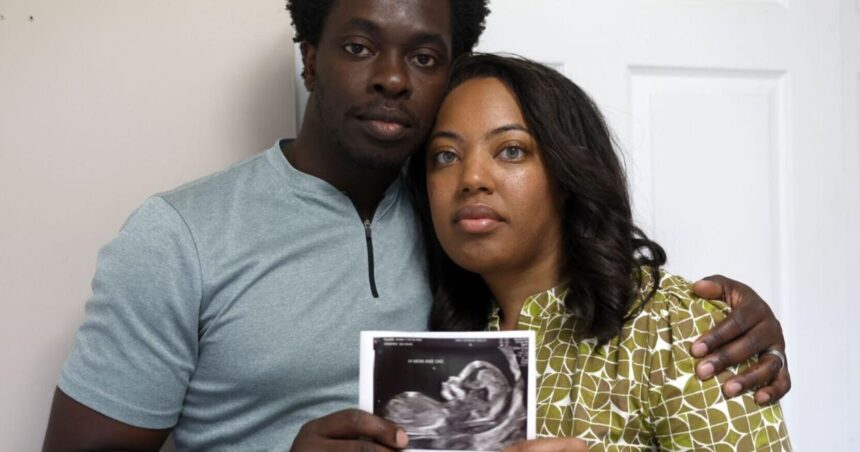FLORISSANT, Mo. — Two weeks ago, Ashley and Kwasi Oyirifi received an email.
After years of struggling to start a family, the Florissant, Missouri couple got the news they had been waiting for. The surrogate carrying their baby was pregnant, and they had entrusted tens of thousands of dollars to a Houston firm to ensure the funds for her were safe.
But then they got an unsettling message from the firm, stating that all operations had been suspended.
The Oyirifis tried to contact the firm, but their calls went unanswered, and their social media presence was gone. It became evident that payments were not being processed.
It soon became apparent that there were potentially hundreds of other families facing the same predicament.
Kwasi and Ashley Oyirifi pose with a sonogram of their daughter, who is being carried by a surrogate in Wisconsin, at their home in Florissant on Tuesday, June 25, 2024.
The authorities in Houston have confirmed an investigation into Surrogacy Escrow Account Management (SEAM) following numerous complaints.
People are also reading…
“My phone hasn’t stopped ringing,” said Houston police Officer William Wright, who received the first call from a SEAM client on June 16.
Houston police Sgt. Chad Long, the supervisor of the department’s financial crimes unit, stated in an email on Monday that they had been contacted by over 30 individuals, and the FBI would take the lead in the investigation due to the widespread geographic distribution of the victims.
Madeline Sieren, a spokesperson for Missouri Attorney General Andrew Bailey’s office, indicated that they had received three complaints regarding SEAM, which were currently under review. The Texas Attorney General’s Office did not provide any information regarding the number of complaints they received or whether an investigation was underway.
Dominique Side, the owner of SEAM, could not be reached for comment.
Despite this, SEAM’s clients are taking action: A Facebook group called SEAM Breach has been established with over 750 members, sharing strategies for lodging complaints, revising contracts, and raising funds to replace their lost money.
For families like the Oyirifis, who were beginning to see light at the end of the tunnel after grappling with the challenges of infertility, it feels like the ground is crumbling beneath them once again.
“Our journey has been quite a saga,” Ashley Oyirifi expressed. “This was supposed to be the happy conclusion we were waiting for.”
Their baby, expected in November, will join them at home from the hospital. That much is certain.
However, everything else remains uncertain, including the additional costs they may now be required to cover.
Millions at stake
Gestational surrogacy, a process where a woman carries a baby to whom she has no biological connection, is a relatively uncommon but increasingly popular path to parenthood. In 1999, U.S. fertility clinics reported 727 embryo transfers to gestational carriers, a number that had risen to nearly 10,000 twenty years later according to the Centers for Disease Control and Prevention.
The global surrogacy market was valued at just under $15 billion last year and is projected to reach almost $100 billion by 2033, as per the findings of Spherical Insights, a market research firm.
The surrogacy journey is fraught with legal and medical obstacles, with regulations varying from state to state. Intended parents must find a suitable surrogate, either through an agency or independently. Legal representation is engaged, contracts are drafted, and a series of medical and psychological evaluations follow.
The expenses can quickly exceed $100,000, with the funds designated for the surrogate typically channeled through an escrow firm.
SEAM is one of a handful of “third-party reproduction” escrow firms in the United States, catering to clients from across the country and abroad.
The escrow service ensures that the intended parents have the necessary financing in place before an embryo is implanted. The firm interprets the contract, disbursing a predetermined monthly stipend along with reimbursements for medical costs and other incidental expenses, such as maternity wear.
“The purpose is to safeguard the interests of both parties,” according to Joanna Beck Wilkinson, a St. Louis attorney specializing in family building.
Beck Wilkinson represents multiple clients nationwide with funds tied up in SEAM. If SEAM is insolvent, the responsibility falls on them to cover the payments, she noted.
The extent of the impact and the timeline for resolution are currently unknown. Posts in the SEAM Breach Facebook group suggest that the total sum held by the escrow firm could be in the millions, as per Beck Wilkinson.
“There’s very little concrete information available,” she remarked.
‘On the edge of giving up’
Surrogacy is rarely the first choice. The decision to opt for a gestational carrier typically comes after enduring years of difficulties, including failed fertility treatments, miscarriages, and stillbirths.
Arielle Mitton of Bellingham, Washington, had undergone almost every form of medical intervention. Her uterus was scarred with tissue.
She and her spouse decided to explore surrogacy, but the process presented its own challenges. Identifying a suitable match is akin to online dating.
“There was a moment when I was ready to throw in the towel,” Mitton remarked.
In November, however, the couple connected with a woman in Rosedale, Indiana over Zoom. It was clear right away that things would work out. They signed a contract in March, and subsequently transferred around $50,000 to their SEAM account.
Their surrogate, Tena Doan, has four children of her own but had always considered carrying a baby for another couple. In April, the Mittons’ embryo was implanted.
The initial trimester was challenging for Doan, as her morning sickness persisted into the evenings. She had to self-administer multiple hormone shots daily.
“There’s a lot you give up to make this happen,” Doan, who works as a server at Outback Steakhouse, acknowledged. She had earmarked her fees for home renovation projects.
Initially, she didn’t think much





